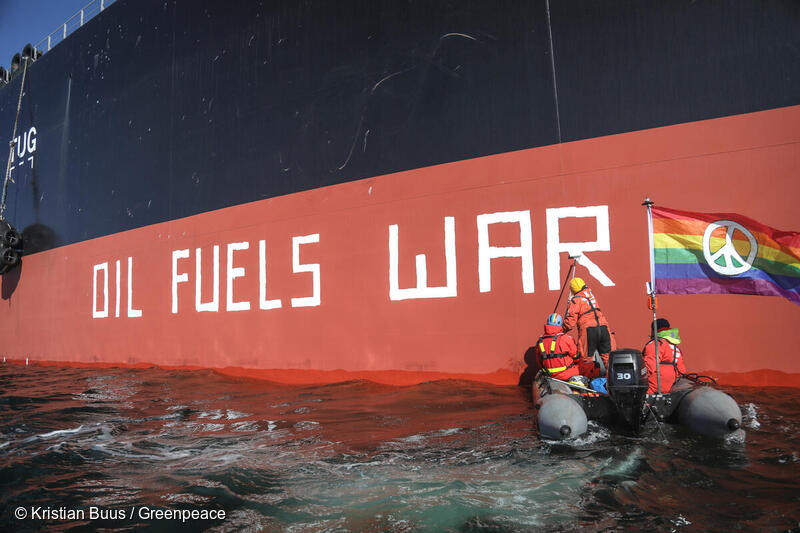Oil companies drive up fuel prices on the back of Ukraine war and energy crisis
Greenpeace calls on EU governments to tax windfall profits and investigate price fixing

Brussels – Oil companies have made about €3 billion in profits through the sale of diesel and petrol in Europe since the beginning of Russia’s invasion of Ukraine, new research commissioned by Greenpeace CEE shows.
In March alone, the oil industry raked in an average of €107 million extra in daily revenues from ramped up prices – €94 million from the sale of diesel, and €13 million from petrol [1] – as consumers across Europe were hit by unprecedented price hikes at the petrol pump.
Klara Maria Schenk, climate and transport campaigner for Greenpeace Central Eastern Europe, said: “While millions of Europeans struggle with sky-high fuel and energy costs, the oil industry is driving up prices to reel in record profits on the back of the war and the ongoing energy crisis. The increase of crude oil prices doesn’t justify price hikes along the supply chain and at the pump. We call on European governments to stop this shameless profiteering from Ukraine’s suffering and impose taxes on these immoral profits. The revenues from these taxes should be used to help households with limited means meet their needs, and accelerate the transition of our oil-addicted transportation sector into a mobility system that serves the planet and people.”
While crude oil prices between January and March increased by about 19.38 cents/litre, the prices increased more significantly for diesel refinery products (by 30-31 cents/litre) and diesel at the filling station (by 36.52 cents/litre). The gasoline/petrol value chain shows a similar, albeit weaker, trend. These substantial revenue margins clearly show how the oil industry has exploited the crisis by driving up prices along the supply chain, while their average cost base has not changed significantly.
Greenpeace calls on EU governments to tax windfall profits
In a reaction to Russia’s invasion of Ukraine, the European Commission has allowed governments to temporarily tax the windfall profits made by the energy sector, but has largely turned a blind eye to the oil sector. So far only a few countries have made use of this, but have focused mostly on additional profits in the gas and electricity market. EU governments must now extend the taxation of crisis profits to the oil industry.
EU Commission & governments must investigate potential price fixing
Following record fuel price hikes in March, Germany and Austria have launched investigations into potential cartel agreements and price fixing. The European Commission has since raided several companies in Germany, although so far this has only focused on gas companies. Greenpeace calls on the Commission to also investigate the recent increase of diesel and refined gasoline and petrol prices across the EU.
Transformation of transport system can end dependence on toxic oil
Meanwhile, the Commission is expected to release a plan to reduce Europe’s dependence on Russian fossil fuels in May – known as REPowerEU– but an early draft completely ignores the transport sector, which consumes two thirds of the oil in the EU. To rid Europe of its dependency on fossil fuels, the EU must turn its attention to the transport sector and introduce measures to accelerate its decarbonisation, starting with an end to short-haul and business flights with train alternatives, boosting public and rail transport, and phasing out fossil fuel-powered cars.
Notes:
- Full analysis by Dr. Steffen Bukold, commissioned by Greenpeace CEE
- Media briefing by Greenpeace CEE
[1] Extra revenue vs. profit: While extra revenues and pre-tax profits differ, the research assumes that extra revenues will translate into higher pre-tax profits (Ebitda) of a similar size, although not exactly in a 1:1 ratio. This means that crisis profits for the sale of fuel in the EU between the beginning of the Ukraine invasion and the date of this publication (7 April 2022) have led to at least €3 billion in profits. For further details please see the full analysis (p. 12).
Contacts:
Klara Maria Schenk – transport campaigner for Greenpeace’s EU mobility for all Campaign: +43 664 881 72267, [email protected]
Marianne Lämmel – Communications lead for Greenpeace’s EU mobility for all campaign: +43 664 881 72245, [email protected]
Greenpeace is an independent global campaigning network that acts to change attitudes and behaviour, to protect and conserve the environment and to promote peace. We do not accept donations from governments, the EU, businesses or political parties. Greenpeace has over three million supporters, and 26 independent national and regional organisations with offices in more than 55 countries.
EU Transparency Register: 9832909575-41
